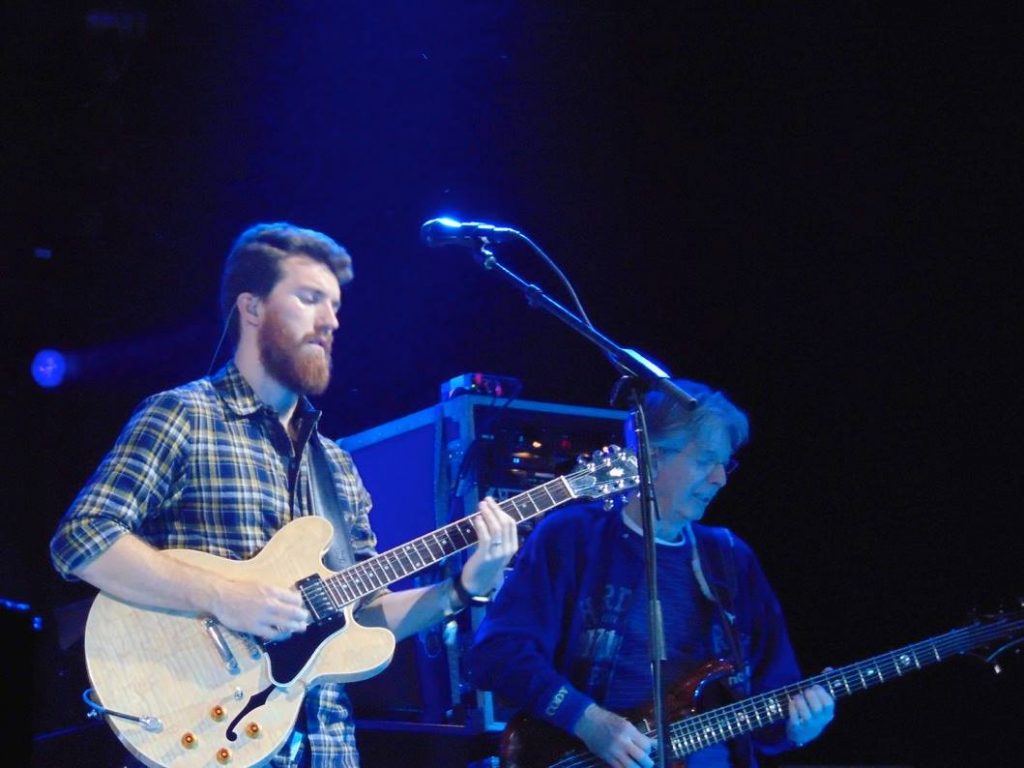
Phil Lesh of the Grateful Dead (at right) and his son Grahame Lesh at the 2017 Monterey Pop Festival (Photo by Vinnie Longobardo)
For the final day of the 2017 reboot of the Monterey International Pop Festival, the roster included two artists who performed at the 1967 original: Phil Lesh of the Grateful Dead, whose band was not yet known nationally at the time; and Booker T. Jones, keyboardist and namesake of Memphis legends and Rock and Roll Hall of Famers Booker T. and the MG’s. And another performer from 50 years ago made a surprise appearance.
But the day kicked off with two bands that prove it pays to stay close to your college friends. Both went to the University of California Santa Barbara with the festival’s Saturday night closer, Jack Johnson.
ALO, an Oakland-based four-man jam band mostly in the Grateful Dead/Allman Brothers tradition, with a little new wave flavor, was up first. They were joined mid-set by their university pal Johnson for “Girl I Want To Lay You Down,” a song with a melody so close to original festival performer Hugh Masekela’s “Grazing in the Grass” that it might as well be considered a tribute. ALO’s actual tribute came in a faithful cover of the Who’s “My Generation” that was not quite as exciting as the original.
Read our review of day two of the 2017 festival
The next band, Hiss Golden Messenger, didn’t have the advantage of a Johnson cameo. Another country-tinged, Dead-influenced rock band, they were well received by the sparse early afternoon crowd. They stuck to their original material, which was pleasant, if derivative.
After a typically wonderful dose of New Orleans funk from the Dirty Dozen Brass Band, singer Nicki Bluhm joined the group for a couple of classics: Irma Thomas’s “Ruler of My Heart” (reworked by original festival attendee Otis Redding into “Pain in My Heart”) and the Blu Lu Barker song popularized by Maria Muldaur, “Don’t You Feel My Leg.” Bluhm killed on Jefferson Airplane’s “Somebody to Love,” with a brass band arrangement not the least bit incongruous, screeching saxophones taking the screaming guitar parts. She and the Dirty Dozen upped the ante by closing with the Airplane’s other huge 1967 hit, “White Rabbit.”
Read our review of the first day of Monterey Pop 2017
Fifty years ago Booker T. Jones led his band the MG’s, along with the Mar-Keys horns, in backing the late Otis Redding for his historic performance. For Jones’ grand return, he put together a group of great young musicians (including his son on guitar, filling in for the MG’s’ Steve Cropper quite confidently) and singers that faithfully recreated the heyday of Memphis’ Stax Records.
Launching into a tight and funky rendition of “Hip Hug-Her,” Jones and the band went on to cover Carla Thomas’ “Gee Whiz,” Redding’s “Respect,” “Dock of the Bay” and “Try a Little Tenderness,” Eddie Floyd’s “Knock on Wood” (with Jones switching from Hammond organ to guitar), Jean Knight’s “Mr. Big Stuff” and Sam and Dave’s “Soul Man” and “Hold On, I’m Coming,” each with all the funk and energy of the originals. All of the big Booker T. and the MG’s hits were included as well: “Green Onions,” “Soul Limbo” and an incredible version of “Time is Tight” that started off as a funereal ballad before morphing into its original funky, grooving tempo. Jones played every song as vitally in 2017 as he did in 1967.
It was a tough act to follow. Kurt Vile and the Violators brought together influences from the Velvet Underground to country to garage-rock to the Americana of Camper Van Beethoven and the Meat Puppets. It was a wonderful change of pace and a great and creative set.
With a guest appearance from Booker T. Jones on organ, blues guitarist Gary Clark Jr. and his band tore it up, jamming into blistering crescendos, a “Voodoo Child” groove here, a “Rollin’ and Tumblin’” shuffle there, a falsetto-laden slow blues. Clark made his debt to Jimi Hendrix explicit in his last number, an extended jam that began and ended with his predecessor’s “Third Stone From The Sun.”
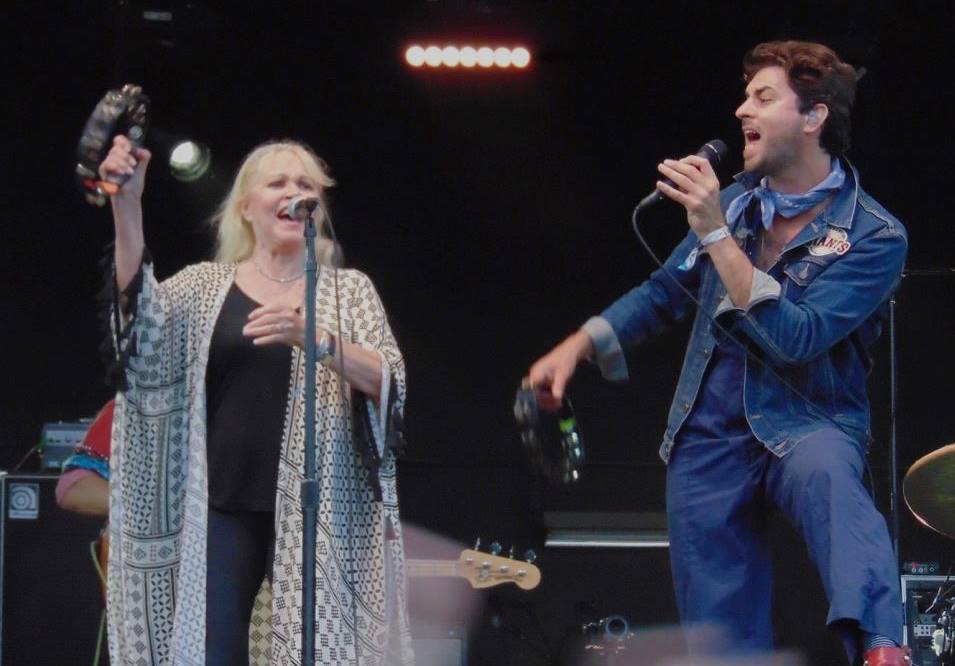
Michelle Phillips and Jonathan Russell of the Head and the Heart, Monterey Pop Festival 2017 (Photo by Vinnie Longobardo)
The Head and the Heart had the unenviable task of following Clark, but the indie folk-rock sextet had a surprise ace up their sleeve. In the middle of a rousing set of originals in the Decemberists/Mumford and Sons/Avett Brothers mold, they broke into a cover of the Mamas and the Papas’ “California Dreaming” and were joined on stage by the last surviving Mama (and third R&R Hall of Fame member to grace the stage on this day), Michelle Phillips, to harmonize with them. It was exactly the intersection of the old and the new, 1967 meets 2017, that the 50th anniversary festival was all about, and it brought together the generations both onstage and in the audience together.
Throughout the festival the music played on the PA system between sets was extraordinary, a mixture of ’60s and early ’70s deep rock. Just before the festival finale, however, a recording of Ravi Shankar from the 1967 festival was played; the late Indian sitar virtuoso’s improvisations and feverish melodic interplay set the perfect tone for the last of the returnees from 50 years ago, Phil Lesh, the Grateful Dead bassist, who brought along his Terrapin Family Band.
Watch a video of the Grateful Dead from the 1967 Monterey Pop Festival
Keeping track of post-Dead aggregations since Jerry Garcia’s death is challenging even for hardcore Dead Heads. The Terrapin Family Band featured only Lesh from the original Dead and no celebrity guests, but its young members, including Phil’s son, Grahame, on guitar, bring a youthful energy and enthusiasm to the Dead repertoire that had slowly faded from the original band’s performances in later years. Rather than delve heavily into the songs that the Dead were performing in 1967, the band primarily stuck, perhaps fittingly given their name, to the complex rhythmic song suites from the Rock and Roll Hall of Fame inductees’ post-Warner Bros. studio albums, including “Help on the Way” and “Terrapin Station,” but also touched on earlier songs like “Box of Rain,” “Jack Straw” and “The Music Never Stopped.” A cover of “Like a Rolling Stone” brought back memories of the famous Dylan and the Dead tour. The only songs that dated back to the band’s 1967 repertoire were “Alligator” and the closer, “I Know You Rider.”
Related: The beginning of the 1967 Monterey Pop Festival
Throughout the show, Phil Lesh smiled broadly, clearly enjoying himself and playing with an impressive passion. Before saying goodnight, Lesh, who underwent a liver transplant in 1998, made a heartfelt request for the audience to sign up to become organ donors so that others could benefit from the medical advances that kept him here to play the Monterey Pop Festival for the second time in 50 years.
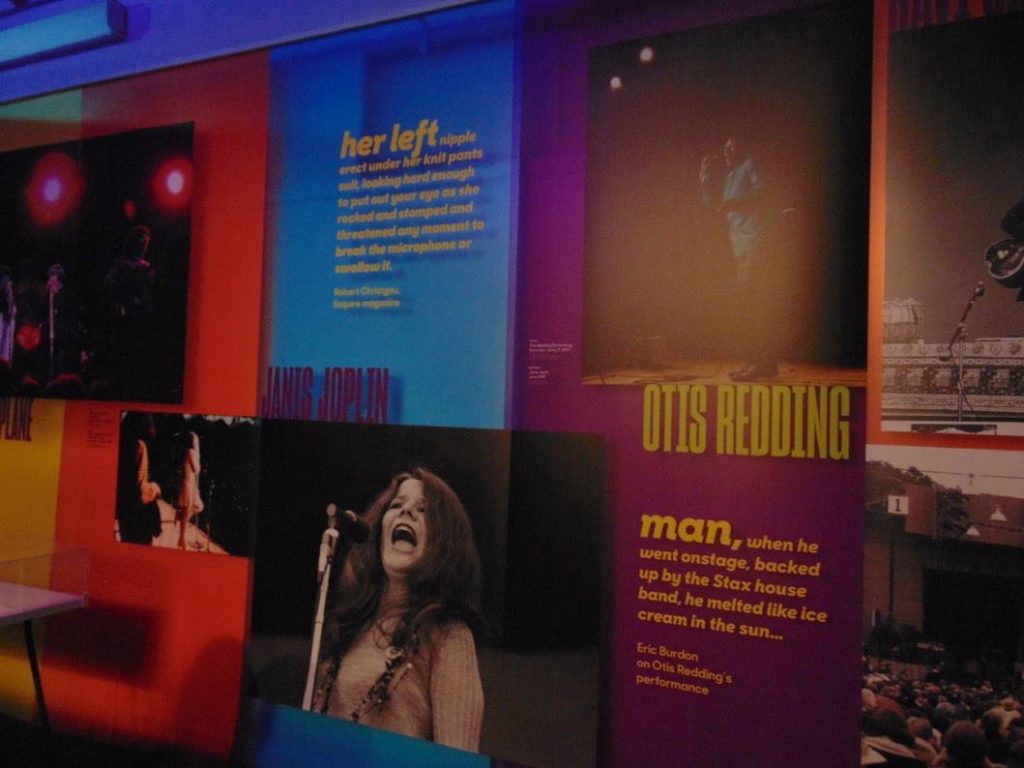
An exhibition on the 1967 Monterey Pop Festival–at the 2017 Monterey Pop Festival (Photo by Vinnie Longobardo)
So, with the 2017 festival now history, the obvious question is how did the 50th anniversary edition, staged in a world so different from that of 1967, compare to the original? As the historical exhibit at this year’s festival showed, in 1967 the corporate music industry as we know it today didn’t exist. In fact, much of what the music biz became grew out of the success of the festival, when newly appointed Columbia Records president Clive Davis signed Janis and Big Brother, the Electric Flag and Laura Nyro following their appearances there. The ways that bands grow, develop and get signed and marketed has changed so much in the ensuing years that no festival will ever again serve as the launching pad for so many superstar artists’ careers at once.
As far as the overall vibe of the festivals, again we live in very different times. No one at this weekend’s event was taking Owsley’s Monterey Purple acid (at least we don’t think so), but the herb that could have landed you in jail for years back then is legal in California now and was in abundant supply. Those who have seen the film know that the audience at the original sat in actual chairs on the field, a veritable luxury in today’s festival world, where general admission and blankets on the ground rule.
On the other hand, while the 1967 event utilized what was at the time considered a state-of-the-art sound system, the sonics of 50 years ago would pale in comparison to the phenomenal sound system at this weekend’s event. The first festival took place, as Simon and Garfunkel once sang, in “a time of innocence.” In today’s modern world, music and touring are a business, a big one. It’s impossible to go back once you’ve eaten the apple.
Perhaps the best comparison was the comment made by one of the members of Sunday’s opening act ALO. After seeing the Monterey Pop documentary as a kid, he said that the original festival was like a supernova from which we’re still feeling the reverberations. This year’s festival, while full of talented and inventive musicians, and one of the best festivals anyone could hope to attend today, could only aspire to surf the waves of the original’s cultural impact.
Watch Otis Redding at the original Monterey Pop Festival, backed by Booker T. and the MG’s

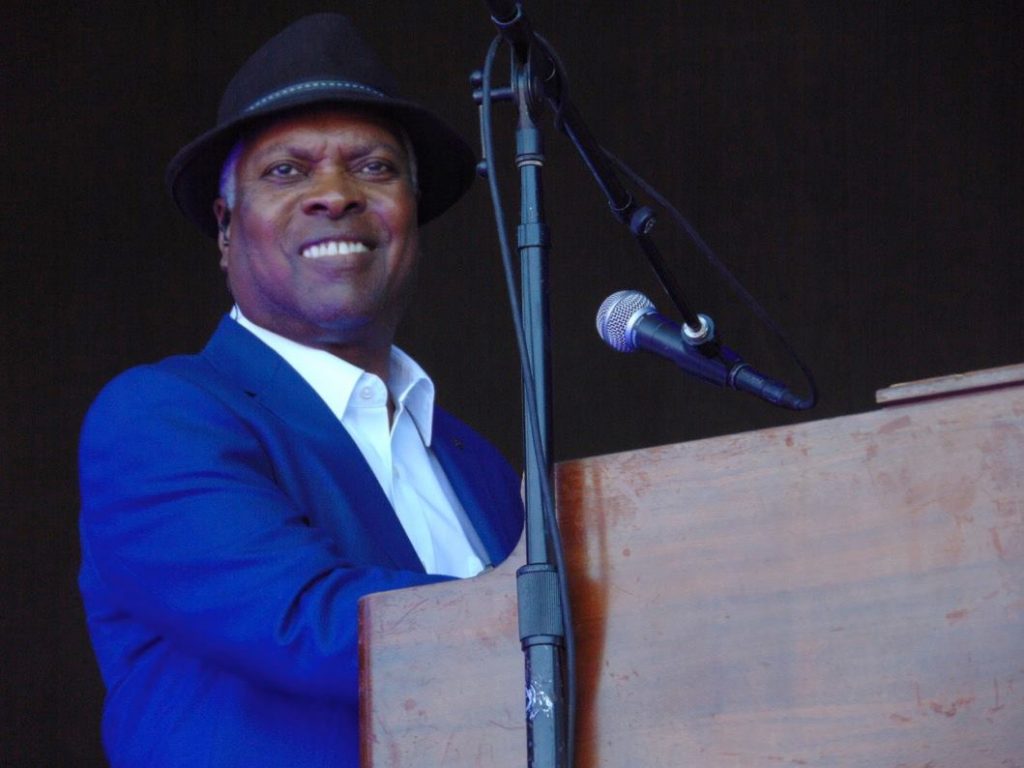
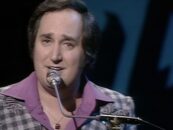
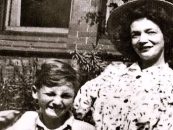
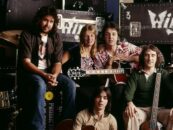
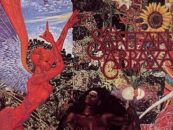

2 Comments so far
Jump into a conversationThis statement is not true: “The only song that dated back to the band’s 1967 repertoire was the closer, ‘I Know You Rider’”. Phil played “Alligator”, which he played at the original fest with the Dead.
Thanks for that info. We’ll make that correction in the article.